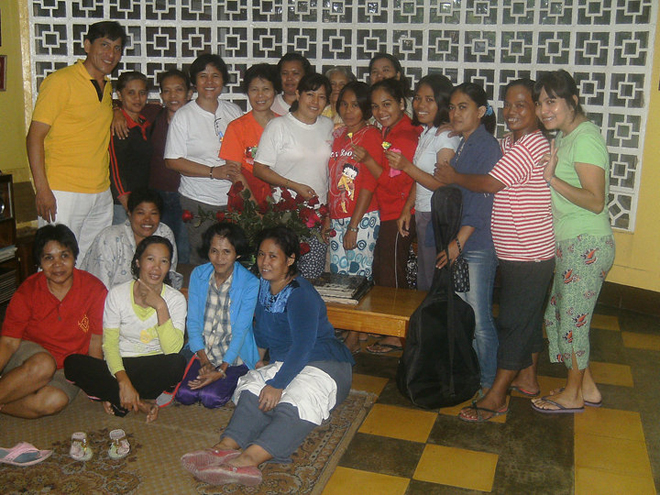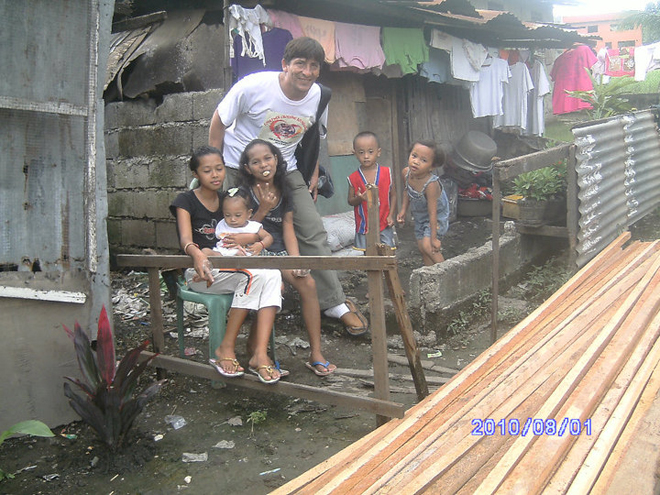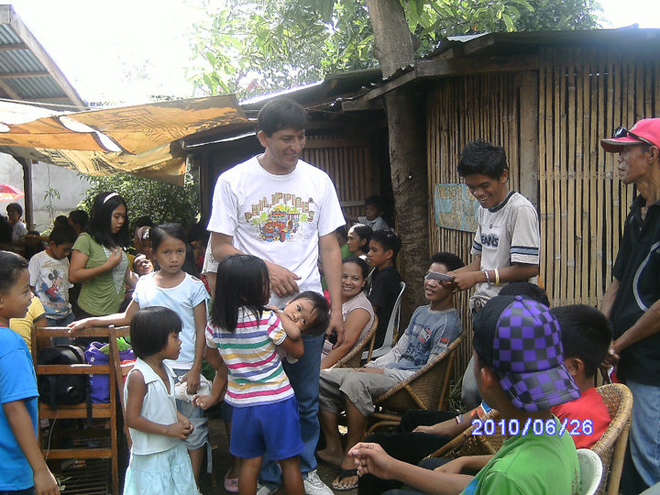Everyday God Greets Me Through The People
‘Cada Dia Dios Me Saluda Atraves de su Pueblo’
From Peru to the Philippines
By Antonio Jesús Salas Villagómez(Translated from the Spanish by Fr Rolly Aniscal)
The author is a Columban lay missionary from Peru working in Cagayan de Oro City. Fr Rolly Aniscal, from Gingoog City, Misamis Oriental, has worked in Peru as a Columban missionary and is now one of our vocation directors, based in Manila.
‘En un pueblo olvidado no sé porqué
y su danza de moreno lo hace mover
en el pueblo lo llamaban negro José
amigo negro José.’
‘In a forgotten town I don’t know why
and his dark man’s dance makes him move.
In the town they call him Black José,
friend Black José.’

So opens El Candombé para José by Roberto Ternán sung by the Chilean group Illapu. Listening to it, I can’t help but think of the many forgotten people around me, many living on the side of the road like the blind man of Jericho. Listening, I hear the sound of the charango and guitar, of the bamboo flute and harmonica and of other instruments. I can’t help but think of the many ‘Josés’, friends who are marginalized, discriminated against and exploited by a system that does not favor the poor or, shall we say, does not favor those already impoverished.
In the midst of the music and dance, I reflect that I am meeting face to face
a God who is a friend, a brother, a companion on the journey and in adventures!
This is the God who is present to me day by day here in the Philippines.

My first assignment as a Columban missionary, in September 2008, was to San
Isidro Labrador Parish in Dumalinao, Zamboanga del Sur, in the Diocese of
Pagadian. However, as a consequence of the abduction of Fr Michael Sinnott in
October 2009, I was transferred to Cagayan de Oro City to work with the Society
of St Vincent de Paul (SSVP).

In Dumalinao I shared my life with the farmers and small-scale fishermen.
There, in the mountains and on the beaches, I encountered humble and generous
people who opened the doors of their houses and of their hearts to me. These are
people who, like the widow in the temple who gave the only centavo she had,
don’t have anything left over which they can offer, but offer what they don’t
have. I had the experience of seeing and feeling the needs of the people. I
walked with them, ate with them, stayed with them, and am happy to love them
despite being seven hours by bus away from them.

The SSVP here in Cagayan de Oro gives Christian formation to its members and
extends help in many ways to people on the margins in this large urban area. The
majority of the members are women so I share my life with them, with young
people and with children.
For me, this assignment is a new gift from heaven because the people here who
so impress me with their day to day attitudes, deeds and words that really fill
me with joy and hope.
During this period the Vincentian Family has been visiting three different
areas of extreme poverty: Cala-cala, Basakan-Penikitan and Corrales Extension.
We have Bible sharing and we also share our feelings, ideas and life
experiences. The members don’t talk about other people but focus on themselves,
sharing their own experience of God and how God is acting in their lives.

In April and May this year we spent time learning karate, and how to dance
the Salsa and Meringue. But what has been really remarkable in the last four
months is that we practiced Filipino dances such as Pandanggo sa Ilaw and
Tinikling, the latter the best known dance in the country characterized by
coordination and balance that is simply amazing.
We’ve also practiced the Huaylas, a folk dance peculiar to the Huanca culture
in the city of Huancayo in the central highlands of Peru.
That is how I meet the God of life and joy, the risen Christ who smiles at
me, who embraces me and who gives me life and the inspiration to continue on my
journey. Every person with whom I share my life is different but all have one
thing in common: a simple faith in God and the will to go out to meet ‘the
other’ in the midst of their poverty.
Time passes slowly and with it comes the daily goodbyes; but my heart and
life are marked by the love of God that has been offered in and through the
Filipino people. I am still thinking of ‘A forgotten people and I don’t know
why’, in the ‘Black Josés’ who are living on the edge of the road.

But I cannot help but smile, even though there are many poor, or shall we
say, many who have become poor because of the system, who, despite the fact that
there are people who discriminate against or exploit others, still offer faith,
hope and love to the less favored. We really learn so much from a culture
different from our own.
Thank you, Lord for showing me your face every day, for caressing my soul and speaking to me through my more humble brothers and sisters.
Thank you, Lord, because not only do you go with me but you live in me.
Editor’s note: The ‘candombé’ is a South American dance of African origin and also the name of the drum used to accompany the dance. The song El Candombé para José became a kind of hymn of political prisoners in Chile during the Pinochet dictatorship. They would sing it when a new prisoner was brought in or when a prisoner was released.
You may email Antonio at antoniojesussv@hotmail.com .
